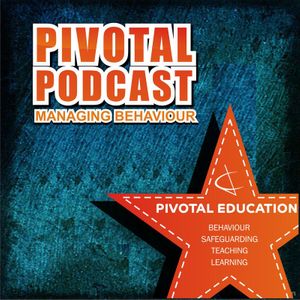Mick Waters on Centralisation, OFSTED and Brilliant Schools – PP112
Pivotal Podcast - A podcast by Pivotal Education

Categories:
It’s great to be back after the Easter break and to kick off the new term with a fantastic guest, Professor Mick Waters. Mick is a former QCA Director of Curriculum, former Chief Education Officer in Manchester, Headteacher in Cumbria and is currently working with schools in The Black Country as part of his role with the University of Wolverhampton. Paul has been watching a lot of Mick’s videos and recommends this one: Aims When Mick was a headteacher, he had three, very simple aims, which he still believes in: * Every child would have the skills and knowledge to influence their own lives * They would leave the school with the desire to keep learning * Years later, they would look back at their time in the school and see it as the best kind of privilege to have attended it Back to basics – knowledge and skills Mick does believe in the basics. However, the knowledge vs. skills debate is an example of where people construct false polarities which don’t really exist to try and force their agenda forward. Children need knowledge and skills – it’s vital that they have both. Mick feels that the word ‘discipline’ always get left out of the debate. You should learn how to apply a subject, how it works in the real world. Children should be learning what a geographer actually does, how linguists work in a different way to mathematicians or scientists. This eans that we should be talking about the discipline rather than getting stuck on knowledge and skills. Paul and Mick agree that they have never seen a teacher just teaching skills and not teaching knowledge at the same time – they don’t think it’s possible. Mick points out that there is a current problem around thinking that there is a set body of knowledge that every person should learn and be able to spit out at the right moment. In fact, knowledge is there to be exploited – we will never run out of knowledge. What we ought to be doing is looking at our 30 students and thinking that gives us a great chance to get them to investigate different areas and combine these. It is collective knowledge which will move society forward, not everyone having the same few pieces. Do you believe in the basics? Mick always answers ‘yes’ to thie question but his definition of basics is very broad: * Art and dance * Drama * Music * PE * Using the outdoors – gardening and growing things * Cooking * Looking at the world as it is now and how it was – geography and history Given all the above, children will naturally learn reading, writing mathematics and ICT in context and in depth. They will also delight in the study of literature, mathematics in a practical not clerical way. Character Paul and Mick share some thoughts on the current character agenda and how it appears to be returning to aspects which were abandoned recently. Mick thinks it’s all about a realisation that the purposes of schooling are confused and some things which have been removed are in fact crucial. Lessons from abroad We often look abroad to countries whose PISA scores are better than the UK’s but what’s happening, reports Mick, is that children from about 10 years old and above in these countries are dissatisfied with the rote learning approaches they have had and are now eager to do active, practical things. These countries think they will have problems with their teenagers in terms of behaviour. Mick goes into details about his predictions in this area. Recent examples of great practice In the main, Mick sees incredible professionals trying to make a massive difference to children’s lives when he goes round the many schools he visits every year. The best practice is where teachers have the nerve to break away from thinking that learning is about 4 sessions where the curtain goes up and you are on stage ...